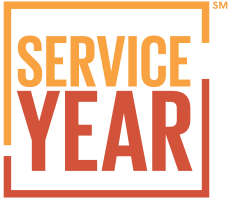.@arneduncan “If we choose to bring people together to solve problems what better way to do that than national service?” #serviceyear
— Service Year (@ServiceYr) November 14, 2016
The Corps Network is thrilled to join many other national service organizations in New York City today to celebrate the formal launch of Service Year Alliance.
We are proud to partner with this important new organization and glad we could be here today to hear from such inspiring leaders in national service as Retired General Stanley McChrystal, Former Secretary of Education Arne Duncan, Civic Enterprises CEO John Bridgeland, and Shirley Sagawa, “a founding mother of the modern service movement.” It was a pleasure to witness Wendy Spencer, CEO of the Corporation for National and Community Service, perform the swearing in for a new cohort of AmeriCorps members from Green City Force, a member organization of The Corps Network.
Service Year Alliance formed early in 2016 through a merger of ServiceNation, the Aspen Institute’s Franklin Project and the National Conference on Citizenship. At their core, these three entities all strove for the same thing: to promote access to, knowledge of, and support for national service opportunities. They merged to combine their resources and expertise into one united effort to make a service year “a common expectation and common opportunity for all young Americans.”
Over the past year-and-a-half, The Corps Network has worked with Service Year Alliance and its founding members on two specific initiatives to enhance the outward value of service year opportunities.
As anyone who has participated in AmeriCorps can tell you, a national service experience can provide a myriad of intangible benefits. Through their service, Corpsmembers develop skills in leadership, communication and problem-solving. They may visit new places, work with diverse people and become more empathetic, engaged citizens. The key is to make these benefits more apparent.
First, starting in the spring of 2015, The Corps Network worked with what would become Service Year Alliance on a pilot project in which Corpsmembers from eight member organizations of The Corps Network worked with instructors from the Council for Adult and Experiential Learning (CAEL) to create online portfolios that captured what they learned through their service. These portfolios were then submitted to colleges for assessment, allowing Corpsmembers to earn up to six college credits for their service.
Currently, The Corps Network is partnering with Service Year Alliance to pilot the use of “digital badges” in defining the knowledge and skills gained through a service year. Via the LRNG online platform, Corpsmembers in this pilot will – by successfully completing various activities – be able to demonstrate their mastery of certain essential workplace competencies, like the ability to manage stress or have a productive disagreement. Corpsmembers will then receive digital badges: online icons linked to information about how he or she developed a given skill. Corpsmembers can link to these badges on their résumés, providing prospective employers with insight into the expertise a service year alumnus can bring to the job.
Today we also celebrate the launch of the Service Year Exchange: an online platform developed through Service Year Alliance that connects young people who want to serve with service year opportunities, like those offered by the over 130 member organizations of The Corps Network. We are thrilled about the potential of this new tool to help more young people engage in national service and help our Corps recruit talented, ambitious Corpsmembers.
National service programs have a tremendous positive impact on our communities, on those who serve, and on the lives of millions of people who benefit from service projects completed by AmeriCorps members and others. Today, The Corps Network proudly joins many major companies, philanthropists and public figures in support of Service Year Alliance and the vision that national service programs can build understanding and empathy among diverse populations and empower the next generation.






































































